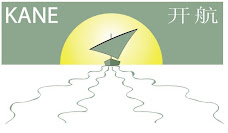Last week I read one of the most astonishing and in-depth policy papers about the Chinese point of view of East Asian military strategy that I have ever seen. It was so impressive that I think it deserves a summary and comment here. I must mention the whole essay is actually excerpts from an interview between General Liu and a reporter from a 2005 article in the Beijing monthly, Dazhanlue guan. Our source is the translation found in the March - April 2007 edition of Chinese Law and Government. This article is so impressive and causes for cogitation on so many issues that I will have to devote more than just one entry to it. Finally, a brief introduction on General Liu copied verbatim from the beginning of the journal is as follows, "The son of a regular soldier in the Eighth Route Army, Liu was born in 1952, joined the People's Liberation Army (PLA) at age fifteen, rose through the ranks accruing extensive command experience, and became deputy political commissar of the PLA Air Force in 2003. Also an accomplished and prolific writer of report literature and novels since the 1980s, Liu has increasingly turned his pen to strategic thinking and military matters and is now one of China's most influential strategic thinkers." [1]
Interestingly enough, Liu starts with Europe before getting into the discussion of East Asia. He states, "In those years (post-WWII), the United States adopted a defensive stance in the face of the menacing concentrations of Soviet tank formations. But now the Soviet Union has collapsed, and the United States has gone on the offensive. However, one should not infer from this change in its offense-defense posture that the United States has shifted its strategic focus away from Europe. In fact, so long as the U.S. objective is to dominate the whole world, Europe reamins its center of gravity, its basic bearing point. It plants one foot on its own land - the United States - and the other foot on Europe. Doing so enables it to stretch out both its arms to cover the whole world. Asia does not furnish the conditions for shoring up the U.S. ambitions...When the Iraq war broke out, Europe saw through the United States' intention of controlling the center of the world as a prelude to taking control of the European continental plate, and they opposed that war with exceptional vigor - in fact, more vigorously than some of the Arab countries. But the United States fought the war anyway, and Europe was forced to swallow the bitter pills."
Fascinating. This is something that stares us smack in the face every day, but I believe we often forget about or overlook the significance of our military bases in Germany and southern Europe, or the reason the UK followed us right into Iraq with barely even batting an eye. The question is, what impact will this have on our Asian strategy?
Before he gets into talking about Japan, he spends a quick minute on a key point about the oversight that most Chinese have when studying the Taiwan issue,
"Those of us who have a world perspective can sense the heavy pressures to which others are being subjected, but those of us who merely have a Chinese perspective only sense that the United States is using the Taiwan issue to cause trouble. Actually, the pressures to which China are subjected are relatively minor compared to those offered by other countries and especially Russia. At first sight, it would seem that the exacerbation of the Taiwan issue places China in a dilemma. If China engages in an all-out arms race with the United States or, in other words, engages in an all-out arms race with Taiwan, it will ultimately be worn down by the United States, just like the Soviet Union. Yet if China maintains a policy of low military spending and devotes its financial resources to economic construction, the disparity will further increase and China will be helpless before the U.S. military blackmail."
From General Liu's perspective then it seems as though China has no way out. But much of this comment is smoke and mirrors and not a very good job of misdirection at that. What we should read between these lines is that there is no intention of China to engage in an arms race with T@iw@n (TW) when it fully believes that its colossal economic influence over TW can be converted into an equally effective political influence over time. Hence, one of General Liu's implicit suggestions of how to resist the expanding US world takeover is to be fought on the steps of the Yuan and TW's other political institutions. This goes a great way to explain why the Communist Party has been so active in inviting TW's leaders such as Lien Chan to tour the mainland and strengthen the political ties between the "two" countries.
[1] Chan, Alfred L Chinese Law and Government, vol. 40, no. 2, March - April 2007, p3
Tuesday, April 1, 2008
General Liu Yazhou on China, Japan, and the United States
Labels:
China,
Europe,
General Liu Yazhou,
Military,
TW,
US Strategy
Subscribe to:
Post Comments (Atom)


No comments:
Post a Comment